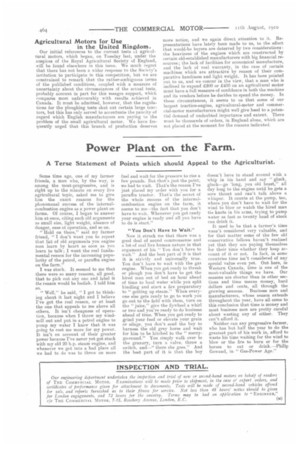Power Plant on the Farm.
Page 2

If you've noticed an error in this article please click here to report it so we can fix it.
A Terse Statement of Points which should Appeal to the Agriculturist.
Some time ago, one of my farmer friends, a man who, by the way, is among the most-progressive, and is right up to the minute on every live agricultural topic, asked me to give him the exact reasons for the phenomenal success of the internalcombustion engine as a power plant on farms. Of course, I began to answer him at once, citing such old arguments as small size, light weight, absence of danger, ease of operation, and so on.
"Hold on there," said my farmer friend, "I don't want you to repeat that list of old arguments you engine men learn by heart as soon as you learn to talk ; I want the real fundamental reason for the increasing popularity of the petrol, or paraffin engine on the farm."
I was stuck. It seemed to me that there were so many reasons, all good, that to pick out any one and label it the reason would be foolish. I told him SO.
"Well," he said, " I got to thinking about it last night and I believe I've got the real reason, or at least the one that appeals to me above all others. It isn't cheapness of operation, because when I threw my windmill out and put in a petrol engine to pump my water I knew that it was going to cost me more for my power. It isn't on account of their greater power because I've never yet got stuck with my old 20 h.p. steam engine, and whenever we got into a bad place all we had to do was to throw on more fuel and wait for the pressure to rise a few pounds. But that's just the point, we had to wait. That's the reason I've just placed my order with you for a paraffin tractor. That's the secret of the whole success of the internalcombustion engine on the farm, it seems to me—the fact that you don't have to wait. Whenever you get ready your engine is ready and all you have to do is start."
"You Don't Have to Wait."
Now it struck me that there was a good deal of sound commonsense and a lot of real live human nature in that argument of his " You don't have to wait." And the best part of it is that it is strictly and universally true. You don't have to wait with the gas engine. When you get ready to thresh or plough you don't have to get the hired man out of bed an hour ahead of time to haul water while you split kindling and start a fire preparatory to"getting up steam." When everyone else gets ready to go to work you go out to the field with them, turn on the "juice," give the flywheel a whirl or two and you're ready to do business ahead of time. When you get ready to grind your feed or elevate your grain or silage, you don't send the boy to harness the old grey horse and wait for him to be hitched to the " merrygo-round." You simply walk over to the granary, turn a valve, throw a switch, and—" there she goes." And the best part of it is that the boy
doesn't have to stand around with a whip in his hand and say " gluck, gluck—go 'long, you old beast," all day long to the engine until he gets a sore throat and can't talk above a mhisper. It counts at the pump, too, where you don't have to wait for the wind to blow or watch the hired man tie knots in his arms, trying to pump water as fast as twenty head of stock can drink it.
It used to be that a farmer's time wasn't considered very valuable, and for that matter some of the few old conservative fellows haven't realized yet that they are paying themselves for their time whether they keep account of it or not. In fact, in some countries time isn't considered of any special value even yet. Out here, in Western Canada, time is one of the most-valuable things we have. Our seasons are shorter than in other sections and time means money, hard dollars and cents, all through the growing seasons. Business men and manufacturers, whose season extends throughout the year, have all come to this conclusion that time is money and most business men are pretty careful about wasting any of either. They can't afford it.
Neither can any progressive farmer, who has but half the year to do the greatest part of his work in, afford to waste his time waiting for the wind to blow or the fire to burn or for the horses to eat or drink.—Plailip Gowand, in " Gas-Power Age."




















